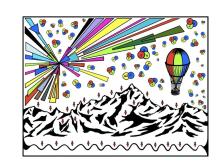More details about specific talks & events: https://iqus.uw.edu/events/iqus-workshop-thermalization/
Organizers: Alexey Gorshkov ( NIST, QuICS, JQI, U. of Maryland), Niklas Mueller (IQuS, U. of Washington), Raju Venugopalan (BNL, C2QA), Nicole Yunger Halpern (NIST, QuICS, JQI, IPST,U. of Maryland)
Quantum computation and simulation promise rapid advances in understanding quantum thermalization, a challenging topic driving many fields. This workshop aims to initiate an interdisciplinary conversation between researchers from high energy and nuclear physics, ultra-cold atomic and molecular gases, condensed matter physics and quantum information science. Its goal is to overcome challenges by exchanging ideas and concepts, as well as developing tools such as lattice gauge theory, aimed at phenomena surrounding quantum thermalization and open quantum systems, from a theoretical and experimental perspective. The workshop will cover interdisciplinary aspects of topics such as Eigenstate Thermalization and Many-Body Localization, Entanglement Structure and Tomography, Hydrodynamization, and Quantum Thermodynamics.
Confirmed participants include:
Monika Aidelsburger (MPI for Quantum Optics, LMU Munich), Alexei Bazavov (Michigan State), Jürgen Berges (Heidelberg University), Doerte Blume (University of Oklahoma), Ceren Dag (Harvard University), Andreas Elben (Caltech), Adrien Florio (Brookhaven National Lab), Alexey Gorshkov (University of Maryland / NIST), Mohammad Hafezi (University of Maryland / NIST), Luke Johns (UC Berkeley), Christina Manuel (CSIC-IEEC Barcelona), Duff Neill (Los Alamos National Lab), Rob Pisarski (Brookhaven National Lab), Anatoli Polkovnikov (Boston University), Felix Ringer (Old Dominion University), Alex Schuckert (University of Maryland), Mark Srednicki (UC Santa Barbara), Federica Surace (Caltech), Nicole Yunger Halpern (University of Maryland / NIST), Torsten Zache (University of Innsbruck)
Format and Scope:
The workshop has a lightly-planned schedule, with two talk sessions per day and plenty of time for interaction and collaboration between participants. In addition, there will be focussed “rump sessions” throughout both weeks. Reflecting the diverse (scientific) background of participants and the interdisciplinary scope, these will allow us to interconnect, identify common goals and learn from each other strategies to reach them. Feel free to send us your expectations and suggestions beforehand, niklasmu@uw.edu. Or, to prepare in advance, let other participants know that you are excited to learn about what common interest you may share.
